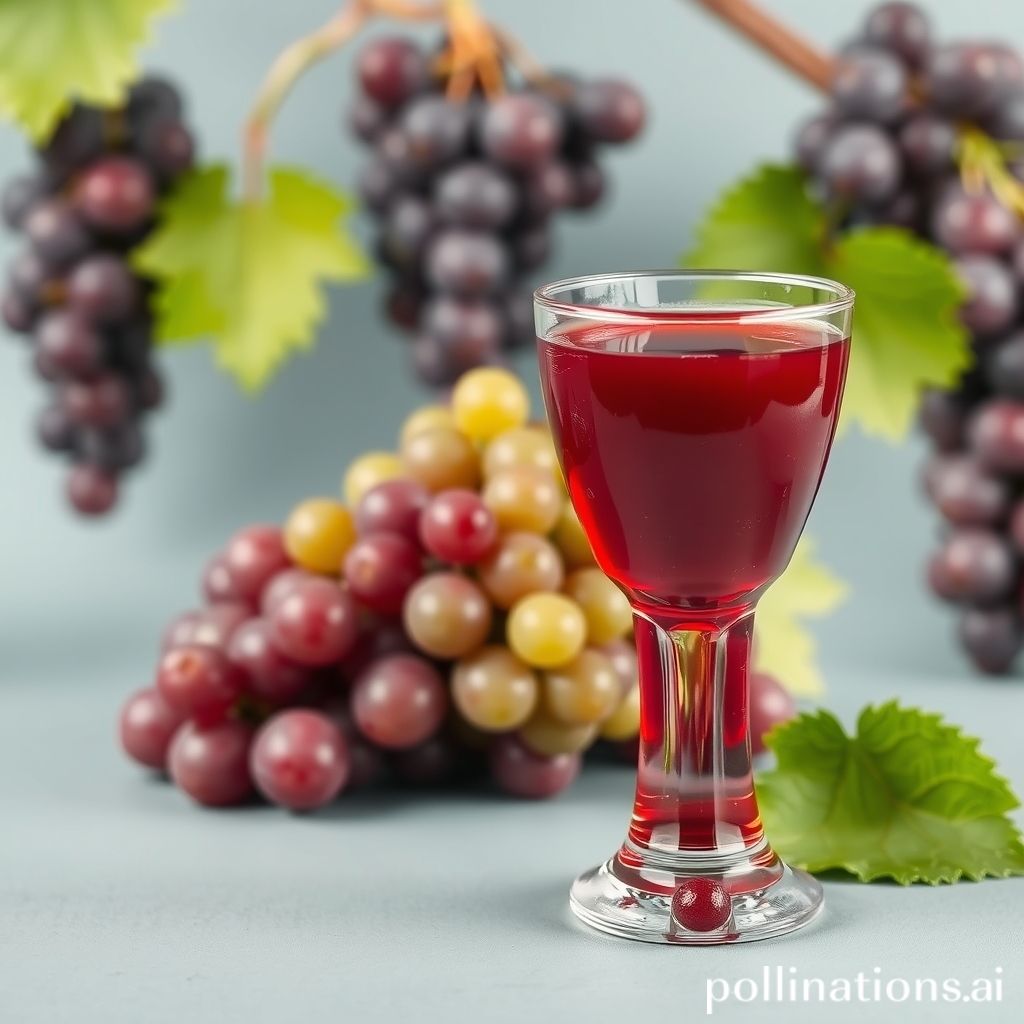Is Grape Juice Good For Gout?
[su_note note_color=”#fb8e00″ text_color=”#000000″ radius=”12″]
Haven’t we all heard about the wonders of grape juice? It’s time to pay attention to this incredible beverage and consider incorporating it into your daily routine. Not only is grape juice delicious, but it also offers a multitude of health benefits.
This refreshing drink keeps you hydrated, At the same time its anti-inflammatory and anti-cancer properties work wonders for your well-being. If you’re someone dealing with cardiovascular issues, grape juice can be a true blessing. Don’t miss out on the goodness of grape juice – it’s time to discover its incredible benefits!
[su_box title=”
[/su_box]

Understanding Gout: Causes and Symptoms
Gout is a type of arthritis characterized by severe pain, swelling, and tenderness in the joints. It is caused by the accumulation of uric acid crystals in the joints, leading to inflammation and discomfort. Knowing the causes and symptoms of gout is essential for effective management and treatment of this condition.
1. What is Gout and How Does It Develop?
Gout is a form of arthritis that occurs when there is an excessive amount of uric acid in the bloodstream. Uric acid is a byproduct produced when the body breaks down purines, which are found in certain foods and beverages. When there is an excessive amount of uric acid in the blood, it can form crystals that build up in the joints, resulting in gout.
Several factors can contribute to the development of gout, including genetics, lifestyle choices, and certain medical conditions. Individuals with a family history of gout are at a higher risk of developing the condition. Moreover, consuming a diet rich in purine-containing foods like red meat, seafood, and alcohol can increase the likelihood of gout. Specific medical conditions such as obesity, hypertension, and kidney disease can also contribute to the development of gout.
2. Common Symptoms of Gout to Watch For
Gout is characterized by sudden and intense joint pain. The big toe is the most commonly affected joint, although gout can also occur in other joints like the ankles, knees, wrists, and elbows. The pain is often accompanied by swelling, redness, and warmth in the affected area.
During a gout attack, the affected joint may become so tender and sensitive that even the weight of a bedsheet can cause excruciating pain. The pain usually reaches its peak within 24 hours and can last for several days or weeks.
It is important to note that gout attacks can occur sporadically, with long periods of remission in between. Nevertheless, if left untreated, gout can lead to chronic joint damage and persistent discomfort.
[su_highlight background=”#f6b40f”]Expert Tips: Understand the causes and symptoms of gout for effective management and treatment. Watch for sudden joint pain, swelling, and tenderness. Seek timely medical attention to prevent chronic damage.[/su_highlight]
The Anti-Inflammatory Benefits of Grape Juice
Gout is a painful condition caused by the buildup of uric acid crystals in the joints. It is characterized by inflammation, swelling, and intense pain. In the midst of this are several medications available to manage gout, many people are turning to natural remedies like grape juice.
1. How Grape Juice Helps Reduce Inflammation in Gout
Grape juice contains compounds that have anti-inflammatory properties and can help alleviate the symptoms of gout. These compounds work by reducing the production of inflammatory molecules in the body. By doing so, grape juice can decrease swelling and relieve pain in gout-affected joints.
Furthermore, grape juice is rich in flavonoids, which have been shown to have anti-inflammatory effects. These flavonoids inhibit the activity of enzymes involved in the inflammatory process, leading to a reduction in inflammation.
2. Venturing into Role of Antioxidants in Grape Juice
Another reason why grape juice is beneficial for gout is its high antioxidant content. Antioxidants help neutralize harmful free radicals in the body, which can contribute to inflammation and damage to the joints.
Grape juice is particularly rich in a type of antioxidant called resveratrol. Resveratrol has powerful anti-inflammatory properties and may help reduce the severity of gout symptoms.
Additionally, the antioxidants in grape juice can improve overall joint health by protecting the cells and tissues from oxidative stress. This can contribute to the prevention of gout attacks and the long-term management of the condition.
| Benefits of Grape Juice for Gout: |
|---|
| – Reduction in inflammation and swelling |
| – Pain relief in gout-affected joints |
| – Inhibition of inflammatory enzymes |
| – Neutralization of free radicals |
| – Protection of cells and tissues |
Grape Juice and Uric Acid Levels
Gout is a type of arthritis caused by the buildup of uric acid crystals in the joints. People with gout often experience painful attacks and inflammation. If you have gout, you may be wondering if grape juice can help lower your uric acid levels and alleviate symptoms. In this section, we will explore the potential benefits of grape juice for managing gout.
1. Can Grape Juice Reduce Uric Acid Levels?
Grape juice contains natural compounds called polyphenols, which have antioxidant and anti-inflammatory properties. Some studies suggest that these polyphenols may help decrease uric acid levels in the body. Nonetheless, more research is needed to determine the specific effects of grape juice on uric acid levels in individuals with gout.
2. Apprehending the Connection Between Uric Acid and Gout
Uric acid is a waste product that the kidneys normally process and excrete from the body. In individuals with gout, the body either produces excessive uric acid or has difficulty eliminating it. This leads to the formation of uric acid crystals, which can cause joint inflammation and pain.
Managing uric acid levels is an essential part of gout management. Making lifestyle changes, such as adopting a healthy diet, staying hydrated, and maintaining a healthy weight, can help decrease uric acid levels. It is crucial to work with your healthcare provider to develop a personalized treatment plan.

Integrating Grape Juice into a Gout-Friendly Diet
1. Tips for Including Grape Juice in a Gout-Friendly Meal Plan
- Evaluate the sugar content: Select grape juice with no added sugars or choose natural, unsweetened varieties.
- Monitor portion sizes: Enjoy grape juice in moderation to avoid excessive sugar intake.
- Pair it with low-purine foods: Combine grape juice with gout-friendly foods like vegetables, whole grains, and lean proteins.
- Stay hydrated: Drink plenty of water alongside grape juice to help flush out uric acid.
2. Other Foods to Consider for Gout Relief
In addition to incorporating grape juice into your gout-friendly meal plan, you can also consider these foods:
- Cherries: Cherries have been shown to reduce gout attacks due to their anti-inflammatory properties.
- Low-fat dairy products: Dairy products like low-fat milk and yogurt can help lower the risk of gout.
- Plant-based proteins: Opt for plant-based protein sources like beans, lentils, and tofu instead of high-purine meats.
- Whole grains: Whole grains are rich in fiber and can help reduce uric acid levels.
To enhance the effectiveness of your gout-friendly diet, it’s important to consult with a healthcare professional or registered dietitian who can provide personalized recommendations based on your specific needs and medical history.
| Information |
|---|
| Grape juice can be a beneficial addition to a gout-friendly diet due to its potential anti-inflammatory properties and high antioxidant content. Incorporating grape juice into your meal plan requires careful consideration and moderation to ensure it aligns with your overall gout management goals. Alongside grape juice, other foods such as cherries, low-fat dairy products, plant-based proteins, and whole grains can further contribute to gout relief. |
[su_note note_color=”#ea2e0c” text_color=”#ffffff” radius=”8″]Extra Tips: Integrate grape juice into your gout-friendly diet for anti-inflammatory benefits and pair it with low-purine foods like veggies and lean proteins to enhance gout relief.[/su_note]
Side Effects and Considerations of Grape Juice for Gout
1. Safety of Grape Juice for Individuals with Gout
Grape juice can be a refreshing and tasty option for people with gout, but it’s important to think about certain factors before adding it to your diet. Meanwhile grape juice is generally safe for most people, it’s recommended to consume it in moderation, especially if you have a history of gout. This is because grapes contain natural sugars and can contribute to high levels of uric acid, which can trigger gout flare-ups in susceptible individuals.
2. Potential Interactions with Medications
If you’re taking medications for gout or other health conditions, it’s crucial to be aware of possible interactions with grape juice. Grape juice contains compounds that can affect the metabolism of certain drugs, such as immunosuppressants or blood thinners. These interactions can either enhance or reduce the effectiveness of the medication, leading to potential health risks. It’s advisable to consult with your healthcare provider or pharmacist to determine if consuming grape juice is safe and suitable for your specific medication regimen.
When adding grape juice to your diet, it’s important to maintain a balanced and varied eating plan. It shouldn’t be relied upon as the sole treatment for gout or any other health condition. Additionally, it’s essential to stay well-hydrated and follow a diet that is low in purines, which can help effectively manage gout symptoms. Always listen to your body and consult with healthcare professionals for personalized advice.
Conclusion
Grape juice can be a beneficial addition to the diet of individuals with gout. Studies have shown that grapes contain compounds that may help reduce inflammation and lower uric acid levels, which are the main culprits of gout symptoms.
The antioxidants present in grape juice also offer protection against oxidative stress, which can worsen gout symptoms. Although, it is important to consume grape juice in moderation, as excessive intake may lead to weight gain and increased sugar levels. Incorporating grape juice into a balanced diet, along with other gout-friendly foods, can contribute to managing gout symptoms effectively.
FAQ about Grape Juice and Gout
FAQ 1: Can grape juice cure gout?
No, grape juice cannot cure gout. That being said, it may help alleviate symptoms and reduce the risk of flare-ups.
FAQ 2: How much grape juice should I consume for gout relief?
There is no specific recommended amount of grape juice for gout relief. It is best to consult with a healthcare professional for personalized advice.
FAQ 3: Are there any specific types of grape juice that are more beneficial for gout?
At the same time all types of grape juice can provide some benefits, it is suggested to choose grape juice made from dark-colored grapes as they contain higher levels of antioxidants, which may help reduce inflammation associated with gout.
FAQ 4: Can grape juice replace medication for gout treatment?
No, grape juice cannot replace medication for gout treatment. It can be used as a complementary approach to help manage symptoms, but medical treatment prescribed by a healthcare professional is essential for effective gout management.
FAQ 5: Are there any risks of consuming too much grape juice for gout relief?
At the same time grape juice is generally considered safe, excessive consumption can lead to weight gain and increased sugar intake, which may worsen gout symptoms. It is important to consume grape juice in moderation as part of a balanced diet.
Read Similar Post:
1. Unlock the Secrets of White Grape Juice: Discover its Surprising Health Benefits!
2. Can Cats Safely Enjoy Grape Juice? Find Out Here!
